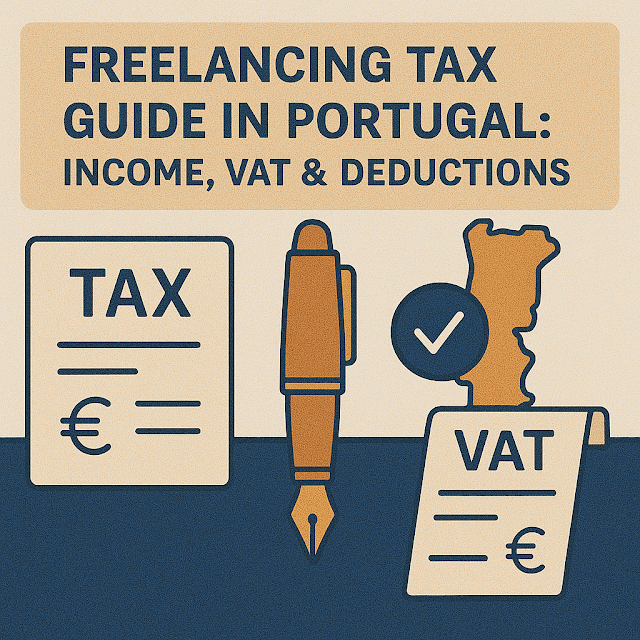If you’re planning to work as a freelancer in Portugal, understanding your tax obligations is essential. This 2025 guide explains how income taxes, VAT (IVA), and business deductions work for self-employed individuals in Portugal.
📌 Who Qualifies as a Freelancer in Portugal?
In Portugal, freelancers are legally recognized as “trabalhadores independentes.” If you provide services on your own (without being employed), you’ll need to register as self-employed and follow the applicable tax rules.
📝 Registering as a Freelancer
To become a legal freelancer in Portugal, follow these steps:
- ✅ Get your NIF (Portuguese tax number)
- ✅ Register as a freelancer at Finanças (tax office) — online or in person
- ✅ Choose your CAE (business activity code)
- ✅ Enroll in Social Security as self-employed
💰 Income Tax (IRS)
Freelancers pay personal income tax (Imposto sobre o Rendimento das Pessoas Singulares – IRS). Rates are progressive and based on your total annual income:
- ✔ Up to €7,703: 14.5%
- ✔ €7,704–€11,623: 21%
- ✔ €11,624–€16,472: 26.5%
- ✔ €16,473–€21,321: 28.5%
- ✔ €21,322–€27,146: 35%
- ✔ Above €27,146: 37%–48%
Note: You’ll submit an annual IRS return in the spring of the following year (March–June).
📦 VAT (IVA) for Freelancers
Freelancers must charge VAT (called “IVA”) unless exempt. The standard VAT rate in Portugal is 23%, though lower rates apply to specific goods and services.
- 📌 You are VAT-exempt if you earn under €13,500 per year (as of 2025)
- 📌 If over that limit, you must charge VAT and file monthly or quarterly returns
- 📌 Use certified invoicing software (e.g., InvoiceXpress, Moloni)
📉 What Can You Deduct?
As a freelancer, you can deduct business-related expenses from your taxable income:
- 💼 Office supplies and equipment
- 🚗 Travel expenses (when related to business)
- 📱 Phone, internet, and software subscriptions
- 🏠 A portion of rent or utilities (if working from home)
- 🧾 Accounting or legal services
Make sure to keep receipts and invoices for all deductible expenses.
📊 Accounting Regimes: Simplified vs. Organized
Portugal offers two tax reporting systems for freelancers:
1. Simplified Regime
- ✔ No need for detailed accounting
- ✔ Taxable income calculated based on a fixed percentage of gross income (usually 75%)
2. Organized Accounting
- ✔ Required if income exceeds €200,000/year
- ✔ Must hire a certified accountant
- ✔ Full deduction of expenses possible
🛡️ Social Security Contributions
Freelancers are required to contribute to Social Security:
- 💶 Standard rate: 21.4% of income (with partial exemptions for new freelancers in first 12 months)
- 📅 Paid monthly
- 🧾 Entitles you to public healthcare, pension rights, and parental benefits
📅 Filing Deadlines & Payment
- ✔ IRS return: March–June (annually)
- ✔ VAT return: Monthly or quarterly (depending on income level)
- ✔ Social Security: Due by the 20th of each month
✅ Final Thoughts
Freelancing in Portugal comes with a manageable tax system—as long as you stay organized and compliant. Make sure to register properly, track your income and expenses, and file on time.
If your income grows or you reach the VAT threshold, consider hiring an accountant to help with the increased complexity.
📺 Want to Learn More?
If you’d like a step-by-step overview of the freelance tax process in Portugal, check out this video walkthrough for extra guidance:
🎬 Watch the video here:
